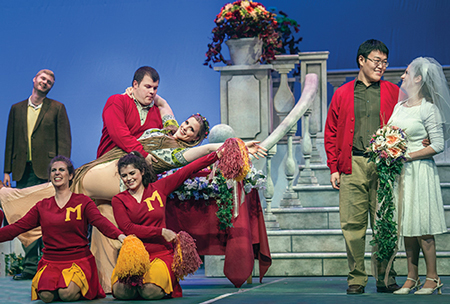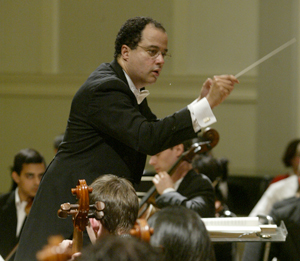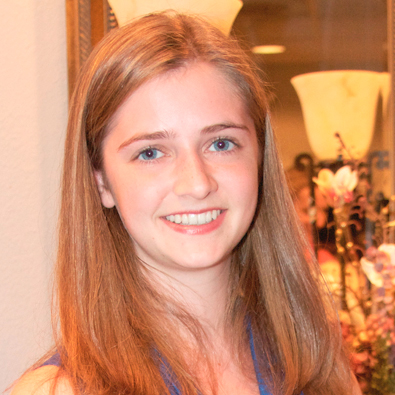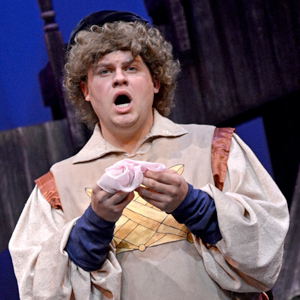by Mike Telin & Daniel Hathaway

“It’s not performed that often, and most people only know it from the overture, which is such a great piece in itself,” conductor Harry Davidson said in a telephone conversation. “For the opera, Berlioz took out all the tragic elements that appear in the play — Héro being accused of adultery and her father disowning her — none of that is there. But it’s very stageworthy and the music is really quite delightful and charming.”
Davidson refers to the piece as an orchestral-driven opera. “Because Berlioz wasn’t a keyboard virtuoso like most of his contemporaries, you can’t predict how he’s going to approach things. If you think of Symphonie fantastique and how very modern this piece sounds, you see some of that in the opera as well. There’s a modernity about it in the way, for instance, that he writes for the double basses separately from the cellos, and writes for trumpets with additional cornets. This piece is from 1862, and Symphonie fantastique was 1830, but this still has that little touch of modernity that you don’t find in composers of that period.”
Davidson said that Berlioz writes well for the voice, even though there are tinges of an orchestral approach there as well. But it’s an excellent piece for the students because the quality of the music is so good. The singers have hurdles to overcome, but they’re not impossible. “The hardest roles, of course, are Beatrice and Benedict — their arias have certain challenges for singers of this age, but they’re fine pieces and gratifying to sing. The students are certainly rising to the occasion very well.”

We spoke to Halla Kalmansson and Kevin Adamik, who will sing the roles of Héro and Bénédict in the Wednesday-Friday cast. Kalmansson, a senior, is a native of the Boston area and Adamik, a native of Pittsburgh, is in his second year of professional studies. We asked them what they knew about the Shakespeare play before taking up their roles in the Berlioz.
Halla Kalmansson: I am familiar with Much Ado About Nothing, and I was very excited to learn that we were doing the opera. But when I first read through it, I was surprised by how much Berlioz took out. In the play, Beatrice and Benedict are supposed to be the main characters, and the opera focuses even more on them than on Hero and Claudio.
Kevin Adamik: I did watch parts of Much Ado just to see what it was like, and I too was surprised by how much the opera focuses on Beatrice and Benedict compared to the play. The opera is pretty much all about trying to get the two of them together.
Mike Telin: Who are the characters in this production?
KA: The production is set in the 1960s on a U.S. college campus. Benedict is a star football player and the team is celebrating a big victory. Benedict begins to think that he might be in love with Beatrice, and begins to consider the advantages to being married even though he would rather be in a monastery than be married to any woman. Playing him as a football player is a little different than what I was thinking about the character at first. Usually in stories the football player gets with the cheerleader, but in this production Beatrice is a hippie.
MT: Did you ever play football?
KA: No, not at all, but I grew up in Pittsburgh, so I am a big Steelers fan and I’ve watched football my whole life.
HK: Hero is a very bubbly character. She’s happy throughout the entire opera. I think she’s completely selfless in her attempt to bring Beatrice and Benedict together, despite the fact that she herself is getting married to Claudio. So it is a very exciting time in her life and she wants everyone to be as happy as she is.
MT: Is the production set at any particular college?
KA: It’s Messina University USA, named after the town in Italy in which the opera is set. But everything is based on David Bamberger’s undergraduate school.
MT: I understand that you’ll be singing in French but the spoken dialogue is in English. Have you sung many roles in French?
HK: This is my first anything in French. I’ve sung one piece before, so it has been a challenging process. I took it step by step: notes and rhythms first, then memorizing the meaning of the words so you can translate that into the music while you are singing — that way it’s more than just syllables that mean nothing to you. But it is a long process no matter what the language is.
KA: It’s sort of new to me to sing an entire major role in French. At first I just focused on learning the notes and vowels. After the holiday break I began to focus on the French. Not being strong in the language, I had to write down every word and its English definition so I would know what I was saying.
MT: What if any musical challenges did you encounter while learning the roles?
HK: One challenge is my first aria. Hero’s talking about how excited and happy she is, but the music is very slow and somber. So it was a challenge to bring out that happiness. I was attracted to the part of Hero right away. It’s in a lower register than I usually sing but it is comfortable in my voice. I am enjoying singing it, and not having any range challenges has made it easier for me to learn the music quickly.
KA: At first, the role felt bigger than what I was used to singing. The past two roles I’ve done were comedic roles, so the singing wasn’t tiring. The music is great, though at first I was worried that it wasn’t my voice type. But I just went into it gently and started learning it. The role fits my voice now and it doesn’t tire me, but it was frightening at first. Benedict has a duet, a trio, and an aria back to back to back.
Production photo by Rob Muller.
Published on ClevelandClassical.com February 22, 2016.
Click here for a printable copy of this article




